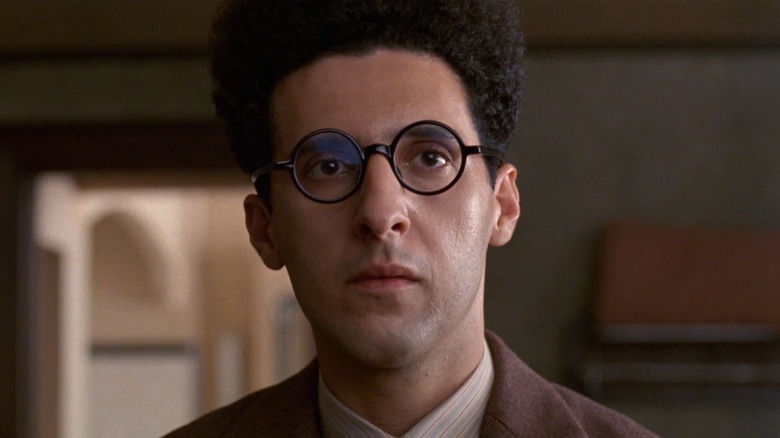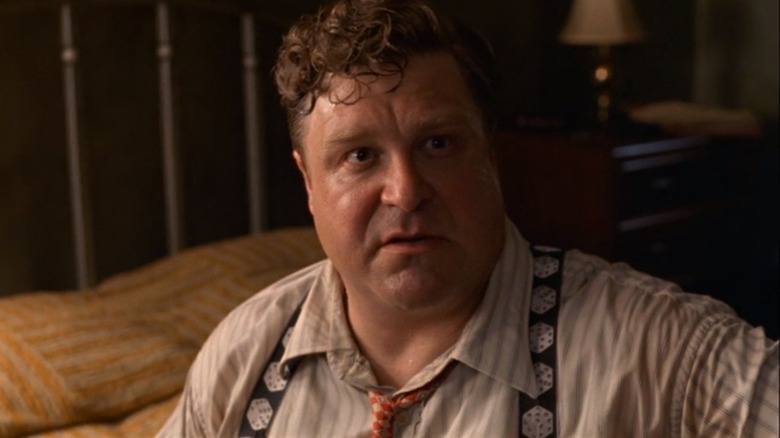The Funniest Fan Theory The Coen Brothers Have Ever Heard
The Coen Brothers are often cagey about the meaning of their films, and in the case of "Barton Fink" — their uncategorizable 1991 film starring John Turturro and John Goodman — perhaps there is no grand unifying message to it. That hasn't stopped critics and academics from analyzing the movie to death, and there are now long Wikipedia sections about its symbolism and themes.
While the Coens may be a national treasure, U.S. critics aren't the only ones who have spent time analyzing "Barton Fink" and developing pet theories about it. The press tour for the Coens' 2016 comedy, "Hail, Caesar!" came 25 years after "Barton Fink," and the film's title arose when an interviewer for HuffPost asked them the funniest theory they had ever heard about one of their films. Ethan said:
"Oh, there's one I remember thinking, 'Oh that's kind of nice,' when somebody said it. You want to talk about surreal experiences. We were in Japan promoting 'Barton Fink.'... And a journalist said — I don't know if you've seen 'Barton Fink' — but a journalist asked if John Goodman's character was real."
Joel chimed in to clarify that the journalist thought Goodman's character, Charlie Meadows, was imaginary (within the world of the film). Ethan added:
"Imagining he's the spirit of the hotel, which is so Japanese. And, you know, not inappropriate, and I said, 'OK, that's kind of nice.' What are you gonna tell them? You say, 'No,' you're a killjoy. And you say, 'Yes.' That's not exactly true."
The Hotel Is the Spirit of Charlie
Without elaborating further, Joel noted that the theory was "not exactly wrong, either." If you look at other comments the Coens have made over the years, it becomes clear that there's a definite connection in spirit between the Hotel Earle and Charlie. The book "Joel and Ethan Coen" by R. Barton Palmer has a transcription of one interview where Joel says they intended the hotel to "function as an exteriorization" of Charlie, with its wallpaper peeling the way "sweat drips off his forehead" and pus leaks from his infected ear.
Instead of Charlie being the spirit of the hotel, it appears the Coens meant the hotel to be the spirit of Charlie.
With his Shakespearean adaptation, "The Tragedy of Macbeth," Joel Coen has officially gone solo. And with the way he and his brother have downplayed the thematic depths of "Barton Fink," it might be tempting — in the spirit of Shakespeare — to see it as a film "full of sound and fury, signifying nothing." Yet there was clearly some intention behind its many symbols, and without a doubt, the Hotel Earl is a place suffused with great atmosphere: an eerie, wartime emptiness, which tips over into hellishness by the end.
The Coens have also likened the hotel to a "ghost ship" (via The New York Times). The Earl's slogan is, "A day or a lifetime," and when Barton Fink checks in for his indefinite stay, it's almost like he's checking into the Hotel California. The Coens would even use a Spanish version of that Eagles song in "The Big Lebowski."
If nothing else, entertaining such theories stimulates "the life of the mind," as Barton called it, and it may soon have you wanting to check into the hotel yourself with a rewatch of "Barton Fink."

